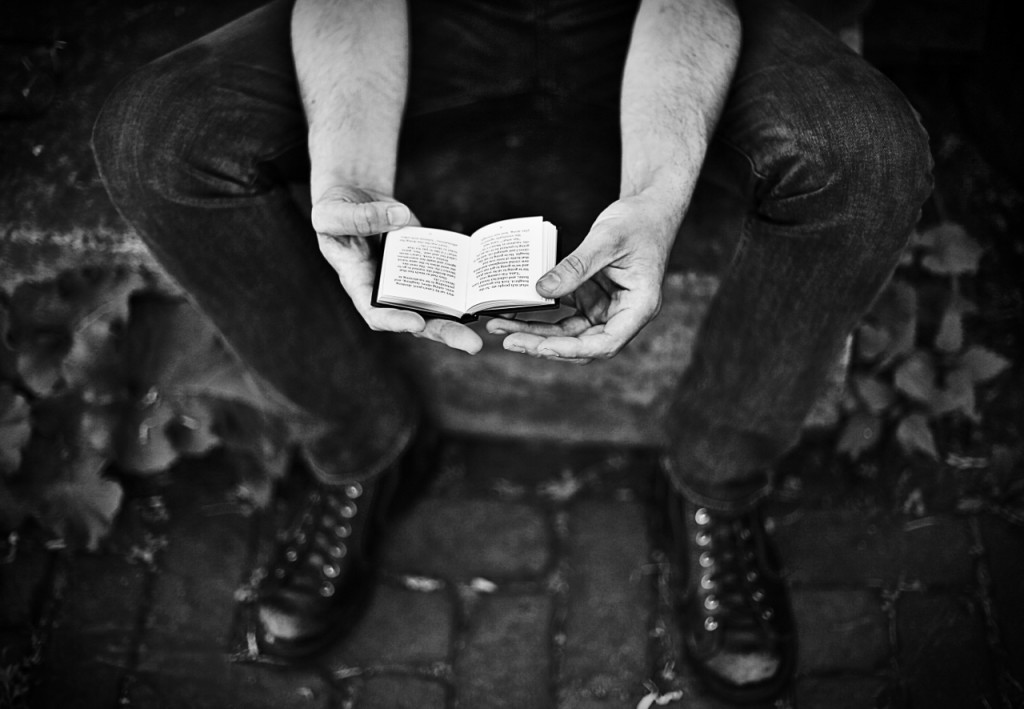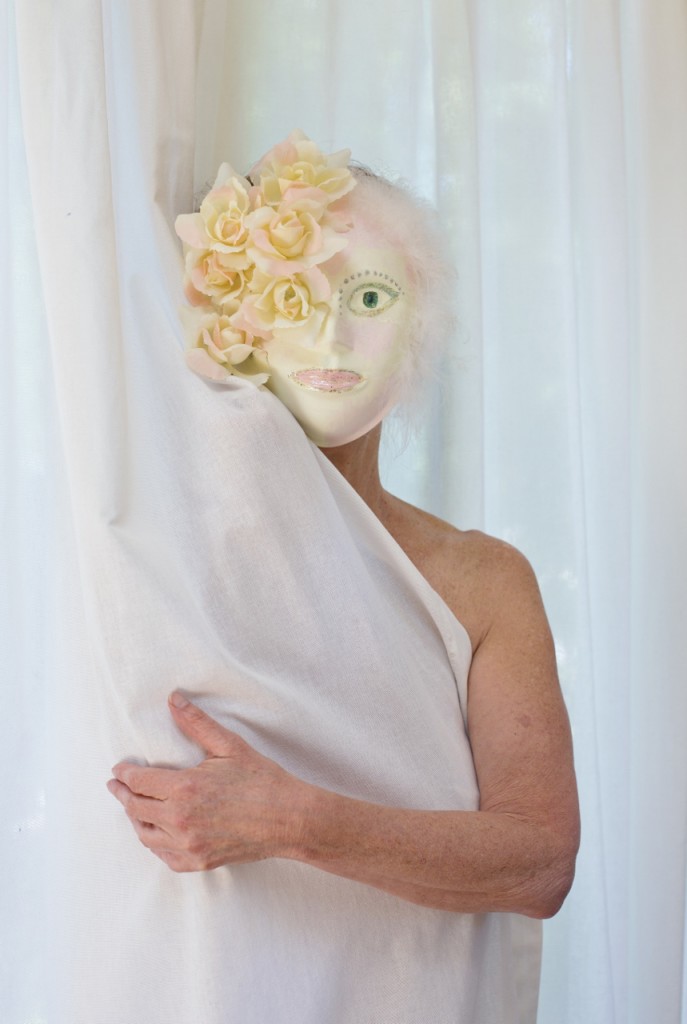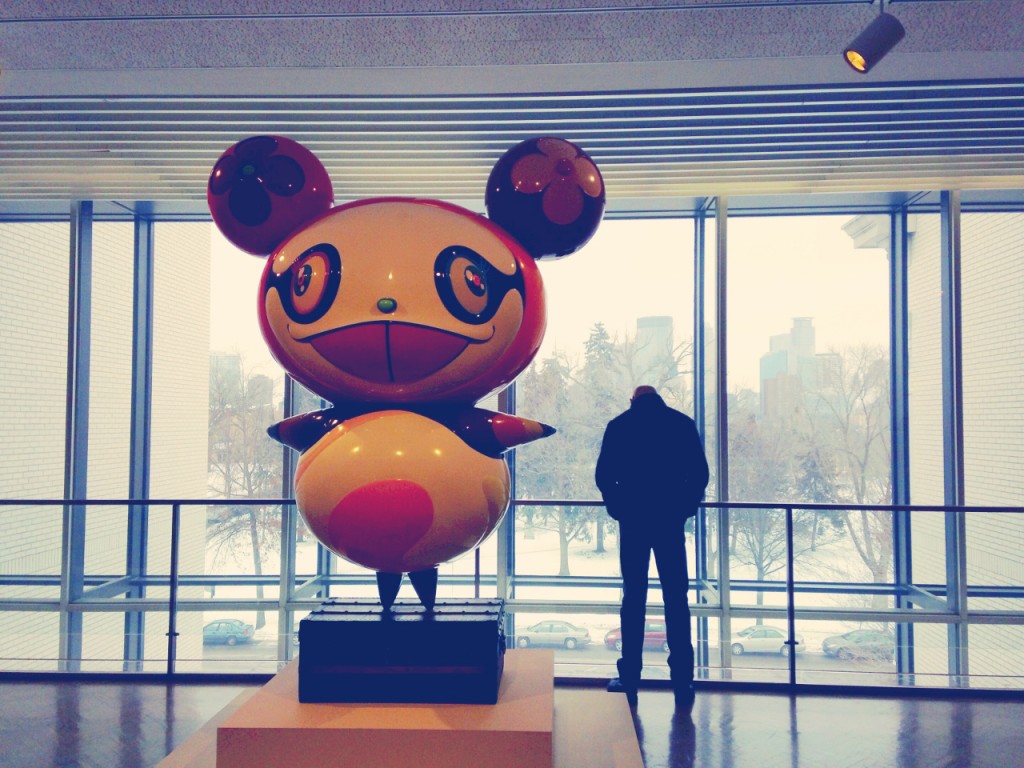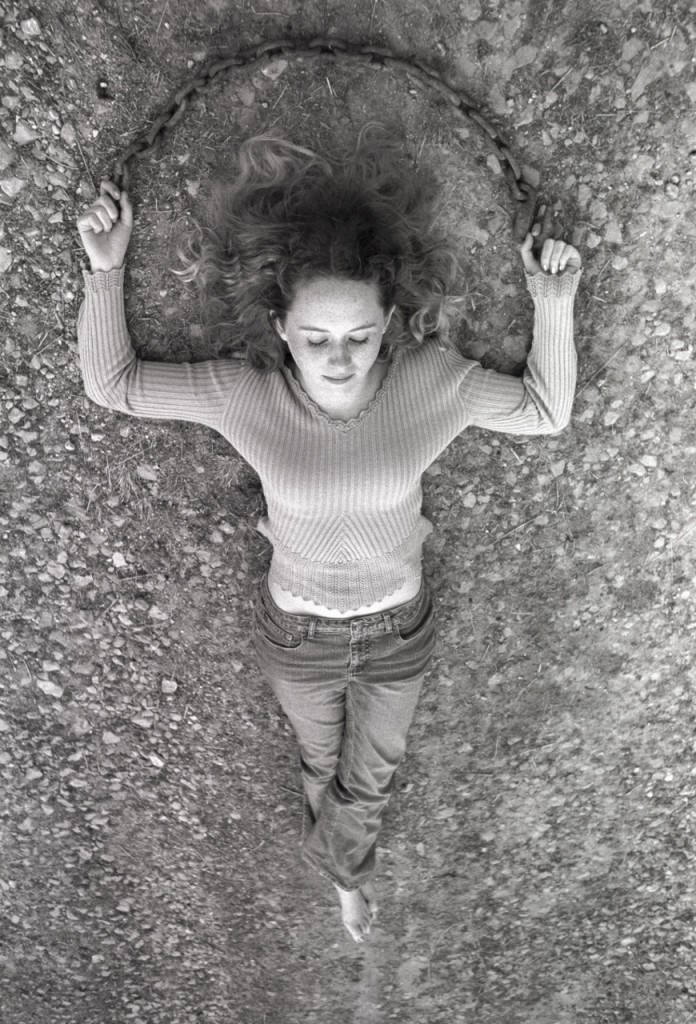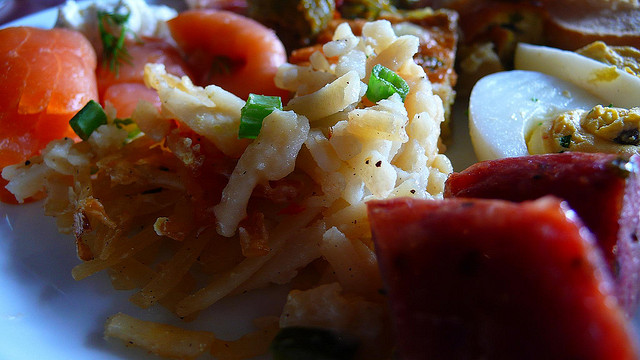Photo by Gina Easley
By Eliza Thomas
Seven years ago, I had my first relationship after sixteen years of being single. I was sixty-two and he was fifty-seven. I remember these numerical details because I’m trying to keep a more precise account of life now. We had a short affair, unexpected and intense, made each other happy, then unhappy, and then it ended. I don’t know if I left him with anything positive, but looking back, I’m grateful for his gift to me.
He was—and I assume still is—a swimmer. It was summer, and we’d meet after work at ponds near our small Vermont town. We started with short stretches; he swam circles around me. Gradually I became strong enough to follow him all the way across. Exercise. At my age, a form I could tolerate, even like.
Other attempts have fallen by the wayside. Exercise is a big deal in my town. People ride bikes outrageously long distances, outfitted in outlandish tight spandex; they jog in place at stoplights; they kayak and hike the highest peaks of the Green Mountains. They ski. The local Pilates classes are always filled.
When I first moved here I joined the gym and tried my best, but failed to find any healthy activity I could stick with. Stairmaster was ridiculous—the stairwell to nowhere—and the rowing machine hurt my back and wrists. The weight machines were complicated torture machines; I didn’t even go near them. My membership lapsed. Forays into outdoor exercise also hit roadblocks. Bicycles proved no match for the steep hill to my home and kayaking was out of the question. I’m too scared of heights to climb any mountain even if I wanted to, and I’m too afraid of falling to ski, even if I knew how. At one point I was certain that jogging would be the answer—so simple, so straightforward, no machines, just me and the fresh air! I bought expensive running shoes and set off optimistically down a flat path along the river. Then, after two or three minutes, I ground to a halt. I hadn’t realized how bone-jarringly hard the ground could be.
But almost every day I come across another item in the news about aging and health and mental acuity and the loss thereof, explaining that as we get older we need regular exercise in order to retain our marbles and maintain a more or less steady heartbeat. The science is relentless, the conclusions foregone. I’ve learned about the unhappy laboratory rats forced into a sedentary life-style, seen pictures of them huddled in a slough of despond, unable to find their way through their own maze, their memory now in shambles. I’ve read the studies demonstrating that running increases brain volume, albeit temporarily, and improves one’s mood. I’ve learned that sitting is unhealthy. Apparently it’s been determined that standing isn’t so great either. Our bodies were meant to move.
So perhaps my new exercise regime will save me from premature decline, even premature death. I’m lucky to have no serious health issues yet. My bones are thinning and I’ve endured a few minor broken bones, but my balance is fine. Most of the time my heart pounds away rhythmically, aside from occasional bouts of disconcerting lurchings that the doctor reassures me are totally “normal.” Still, at my age it is difficult to avoid uncomfortable calculations. For example: Was it irresponsible to get a puppy? What if I become unable to take him for walks? I’m a pianist, with a piano even older than I am, but how can I consider purchasing a newer instrument when who knows how long I’ll be able to play? And then there are those meager savings. If I live twenty more years, how can I stretch the dollars? Should I be planning for the inevitable decline now—should I be saving all my spare change in a big jar and never shop for anything frivolous ever again?
I try not to dwell on these questions too often, though sometimes in the middle of the night, waking up from one or another unnerving dream, I experience a sense of impending doom. But in the light of day I tell myself that swimming can’t hurt, and in any case I seem to have taken to it like a fish to water. So I shop with enthusiasm, treating myself to a variety of “athletic” bathing suits, specialized swimmer’s shampoos, a pair of training flippers I rarely don, and a device to help me keep track of how many pool laps I’ve just completed. I may not—do not—know many more years I will be around, but at least I can count the laps I swim every week. And in the meantime I’ll have a bathing suit that’s not too hideous and very clean hair.
During the long Vermont winters I swim at the local pool. I tell myself to aim for grace, not speed, as virtually every other swimmer plows past me in the adjoining lanes. I’ve learned to reach, stretch and glide, and I try not to splash. I’ll never get any faster, but progress is an open-ended word. For me, progress is exactly one mile, three times a week. This is good. In the water my aging body feels almost ageless, sleek and smooth. My hips are no longer stiff and achy, and my muscles actually have definition. Though I’m not entirely sure what it means, I believe my “core” is stronger now. I am also humbled by the tenacity of other women I see in the locker room getting ready to swim, all shapes and sizes, in all stages of life, of health and of sickness. I think: water is life.
In the fleeting summers I look forward to swimming outdoors. After my short affair summer ended, I tried bringing my two dogs along—there are always many other dogs frolicking joyfully with their owners. Surely, I thought, my dogs would join in the fun. But my older dog, a dignified, gentle lab mix named Monday, disdained water—she wouldn’t even wade—while Mario, my silly young setter, became frantic to save me, or himself, or possibly some phantom of his overactive imagination, from drowning. He plunged in after me, churning up the water and clawing my latest bathing suit to shreds.
So now I go alone to the pond. In keeping with my resolve to keep an accurate account of life, now that it seems to be passing so quickly, I’ve pored over regional topographical maps, but so far I haven’t been able to measure the length of the pond with any precision. Maybe it’s just as well. Maybe some spans just can’t be calculated; maybe it doesn’t matter how far it is across and back. For now, it feels long enough. I emerge from the water at the end of my swim like some early ancestral amphibian, crawling over the rocks of the shoreline, gasping for air, finding my feet, trying out my lungs in the new environment. Then I find my towel, flop down, and triumph in my evolutionary transformation.
There are a few downsides. For one thing, the water seems to be getting colder. Perhaps this is an effect of the aging process or a chilling harbinger of climate change. Whatever the reason, even at the height of summer, I sometimes find myself shivering uncontrollably in the water, and by the time I finish my forty-minute swim my hands are numb and bluish, my teeth clacking audibly. It’s embarrassing, though not as embarrassing as the items I’ve recently purchased will be, assuming I ever manage to get them on: one purple neoprene vest, one skin-tight black neoprene jacket with impossible pants to match, and a lime green neoprene swim cap.
For another, I’m very near-sighted, and for the first few years of swimming I relied on blind instinct to find my way back to shore. So I was surprised and encouraged to find prescription goggles in generic form for a mere sixteen dollars. (I bought several pairs.) It helps to see where I’m going, but now that I see clearly, there are times I’d really rather not. I now make out with ease the tangles of weeds, globs of murkiness, disconcerting swarms of tiny fish. Far below, I discern the shapes of larger creatures slipping through the darkness. They look ominous and deadly, though they are probably only carp. Still, I’d rather not know what lies beneath.
And finally, there have been a few times in bad weather, struggling against wind and choppy waves, when I’ve thought: Maybe I won’t make it. I will die here. And then people will say at my funeral, “Ah, but at least she died doing what she loved.” I would hate that. I don’t want to drown. I don’t want to die, not here, not now, not in the middle of this pond. I don’t even want to think about it. I haven’t told anyone yet that I do not want to be embalmed—a fate, I think, worse than death. I don’t want to be discovered, days later, bobbing/floating/sinking in this murky water. It would be so terrible. And then there are my dogs, starving to death at home or, ironically, dying of thirst. So. The admission that I might be a little afraid has led to another purchase—a “swim buddy,” a small orange inflatable sausage that trails behind me across the lake. It even has a whistle. Just in case.
Despite these downsides, I love to swim outdoors. The sensation of gliding horizontally, the solitude and open space, the rhythm of my breath, the rocking balance, the absence of the fear of falling—it’s all gloriously different from being vertical and walking on the dry, unyielding ground. I don’t get to look around much, head down most of the time. But halfway across I roll on my back and rest. I wonder why anyone would wish to walk, walk upright, on water, when it is a wonder enough to float along its interface with air. I look up at the endless sky, watch the drift of the clouds, and turn to the surrounding woods along the shore, edged with the countless hues of the forests. On calm days, the trees and sky are mirrored perfectly in the still surface of the pond. Every detail is in place, only upside down. The image is so seamless that it’s hard to distinguish reality from its reflection, difficult to determine where land meets water.
Then I take off my prescription goggles for the old perspective that nearsightedness allows. Colors quiver slightly and merge; the outlines of people and dogs on the far beach mingle into a vague scatter. Mysterious forms hover in midair across the water, while the forests are billowy clouds, spilling their green along the shore. Sometimes the shoreline itself vanishes in a mist. I float in the middle of the pond, arms outstretched to a world that shimmers in the light.
•••
Inevitably, however, light casts a shadow. It’s fall as I write this. Outdoor swimming is over for the year, the days are shortening, and my dog Monday, she who disdained water, has died. She was far too old—over seventeen years—and unhappy at the end. I finally made the call, and a man with a heart of gold and the patience of a saint came to the house and sat with us for an hour before giving her last shot. The distance was just an immeasurable sigh, and she was gone. The nice man carried her frail old body away and a few weeks later dropped off a jar of ashes on my doorstep. Mario seems to have taken her absence in stride, but I’m still overwhelmed by the emptiness she left behind, still feel the complicated regrets of having had her put down, of having waited too long, of having not spent more time with her in the last months. All those hours swimming, and I could have been home with her. I have not yet figured out what to do with her ashes. I feel bad about that too.
But the other night I dreamed I was flying, only it was underwater. I sensed a movement, a dark reflection hovering nearby, and for a moment I was apprehensive. Then I saw her. She was right alongside me, my beautiful old dog, my own beautiful ghost swim buddy. Our eyes met in recognition, as if we’d been doing this forever. We were skimming together just beneath the surface. Miraculously, breathing was no problem. Our bodies were sleek and strong, our movements ageless and full of grace. We wove in and out with the current for a while, then together we turned to dive deeper, swooping down through the water, soaring effortlessly, effortlessly alive.
•••
ELIZA THOMAS is a piano teacher and accompanist. She lives in Montpelier, Vermont, with her dog Mario.

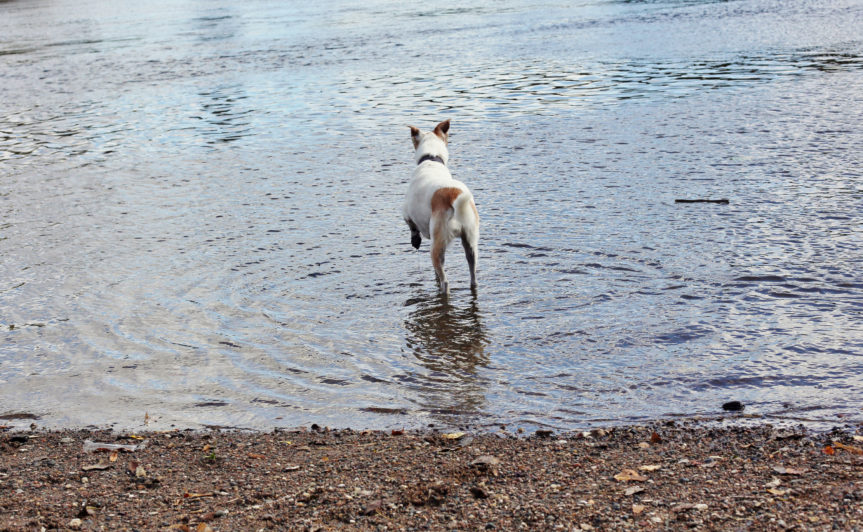
 Follow
Follow

